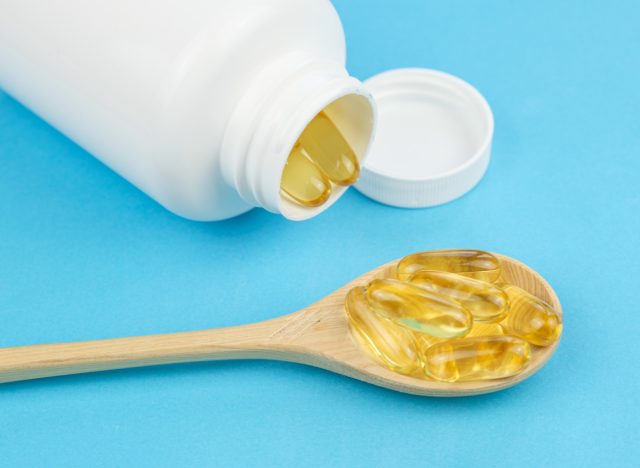The #1 Best Supplement If You Have Heart Disease, Says Dietitian

Disclaimer: If you have heart disease, be sure to ask your healthcare provider about this scientifically-proven supplement.
Heart disease is one of the most common chronic conditions in the United States. According to data from the Centers for Disease Control and Prevention, more than 600,000 Americans have heart disease, and, prior to Covid, it was the leading cause of death in the U.S., representing one in every four deaths.
The good news is that most cases of heart disease are preventable with diet and lifestyle changes. And the American Heart Association (AHA) recommends just one supplement for individuals with coronary heart disease, the most common type of heart disease in the United States: omega-3-fatty acids.
The most common type of heart disease is coronary artery disease, which can lead to a heart attack. Other types of heart disease include heart failure or congenital heart defects. Since coronary artery disease is the most common and is considered mostly preventable as it is related to lifestyle choices, this article will focus on the best supplement for coronary heart disease, omega-3-fatty acids. Read on, and for more ways to support heart health, don’t miss Eating Habits to Avoid For Better Heart Health After 50, Say Dietitians.
Making holistic lifestyle choices is key to supporting a healthy heart.

Although omega-3 supplements can support heart health (keep reading for more), if you’ve been diagnosed with heart disease, chances are your healthcare provider primarily provided counseling about a heart-healthy eating pattern and exercise guidelines to help manage or even reverse the condition.
Decades’ worth of research also proves that dietary interventions—such as lowering saturated fat and sodium as well as increasing intake of plant-based foods and beneficial omega-3-fats—are beneficial to prevent and manage coronary artery disease.
According to a report in the journal Circulation, the AHA focuses on seven core diet and lifestyle steps to maintain a healthy heart that include the following: stay active, keep a healthy weight, try to maintain a healthy blood cholesterol level, do not smoke or use smokeless tobacco, eat a heart-healthy diet, keep blood pressure healthy, and learn about blood sugar and diabetes.
How omega-3 supplements support better heart health.

Omega-3 fatty acids are anti-inflammatory polyunsaturated fats that have heart health-supporting properties. There are tens of thousands of scientific studies, including a review article conducted by the AHA, supporting the coronary heart health benefits of omega-3 fatty acids. The three main omega 3s are alpha-linolenic acid (ALA), eicosapentaenoic acid (EPA) and docosahexaenoic acid (DHA). The two with the most health benefits include EPA and DHA.
These fatty acids are considered to be “essential fats” because humans cannot produce them in the body, so we have to consume them through diet alone. Fish are the best sources of EPA and DHA omega-3s and there are also plant-based sources of ALA, like walnuts, chia seeds, and flax seeds.
According to the AHA, a healthy diet and active lifestyle should be your first line of defense to keep your heart healthy, but because most Americans don’t eat at least two servings of fatty fish each week, the AHA recommends an omega-3 fatty acid supplement to ensure you get the optimal amount of these beneficial fats. In fact, AHA food consumption data show that just 16 to 24 percent of U.S. adults meet the weekly fish recommendation of at least two servings (3.5 ounces) of fatty fish per week. There are a couple of reasons why Americans don’t consume enough fish, including that eating that much fish and seafood is expensive and unsustainable.
How much EPA and DHA is enough?
To help reduce the risk for coronary heart disease and treat the condition, the AHA recommends a daily supplement of EPA and DHA omega-3s that provides at least one gram or 1,000 milligrams (mg) of EPA and DHA.
If you have been diagnosed with high triglycerides (blood fats), two to four grams of EPA and DHA per day, in the form of capsules and under a physician’s care, is recommended.
Even if you don’t have heart disease, if you don’t eat fish at all or infrequently, you probably want a daily dose of 1,000 mg EPA and DHA. If you eat 2-3 servings of fish per week as recommended, you might need less. The only way to know for sure if you’re getting enough EPA and DHA is to get your levels tested. A simple at-home finger-prick test is all you need.
How to choose an omega-3 fatty acid supplement.
Look for supplements that provide at least 500 mg of EPA and DHA per single serving. Taken twice daily, you will obtain the recommended one gram daily.
Check to see if the supplement brand is a member of the Global Organization for EPA and DHA Omega-3s (GOED). GOED member companies adhere to standards of quality and ethics that are among the strictest in the world. Another good check is to see if the supplement has a 5-star rating from the International Fish Oil Standards (IFOS) program.
READ MORE: The #1 Best Omega-3 Supplement to Take, Says Dietitian
What about other supplements for heart health?
You may have heard that antioxidant supplements can help treat your heart disease; however, the AHA says that there is not enough scientific evidence to support the use of antioxidants including vitamins A, C, E, or beta carotene for heart health. Instead, public health authorities generally recommend eating a diet similar to the Mediterranean Diet, which is high in plant-based foods, seafood, unsaturated fats, whole grains and contains low amounts of animal-based foods, saturated fat, and sodium.









